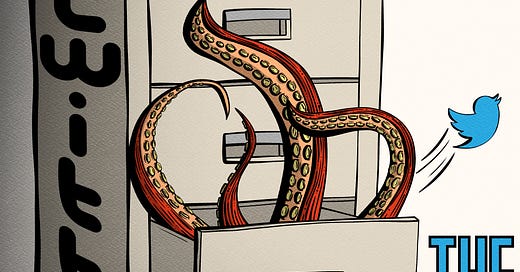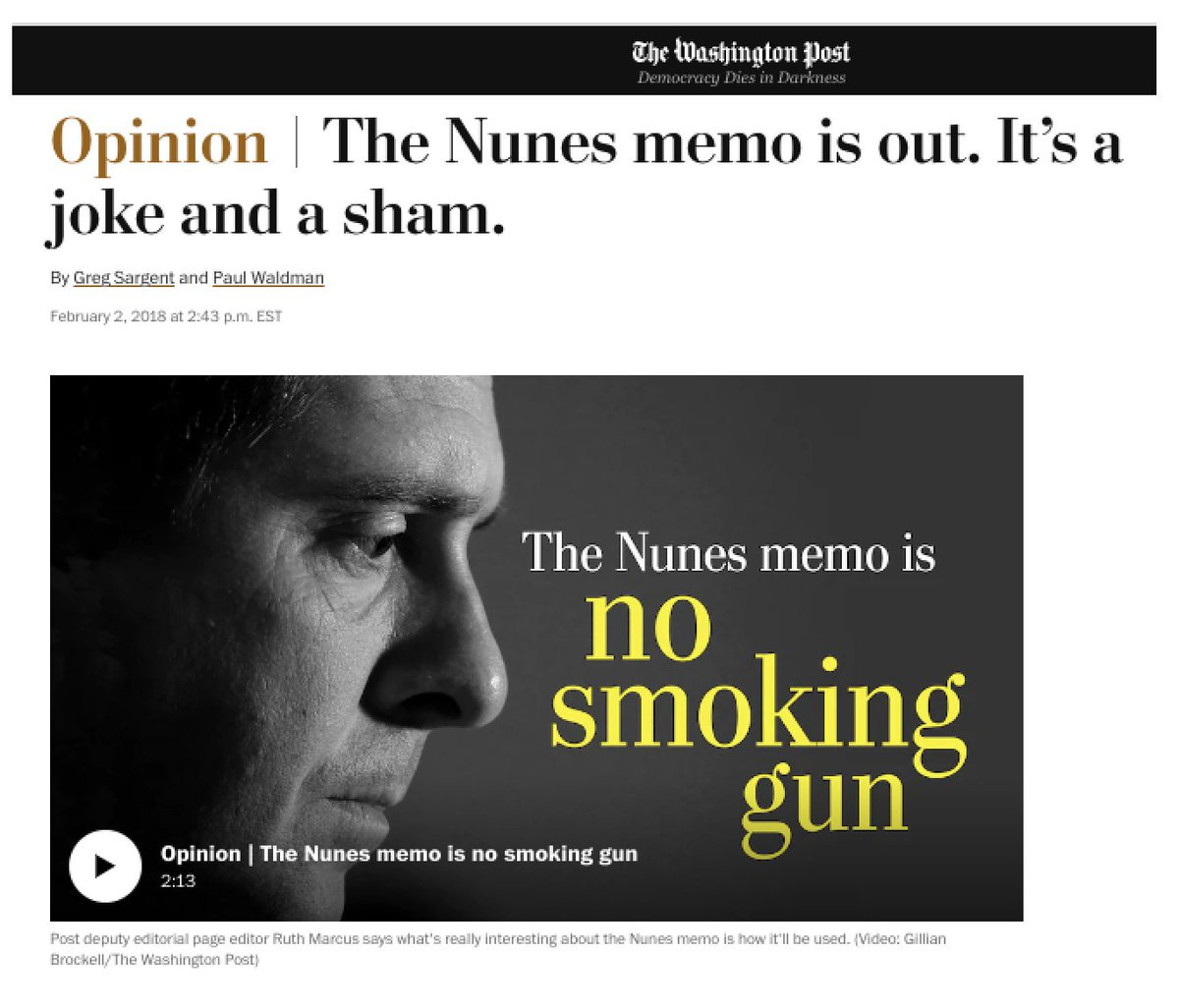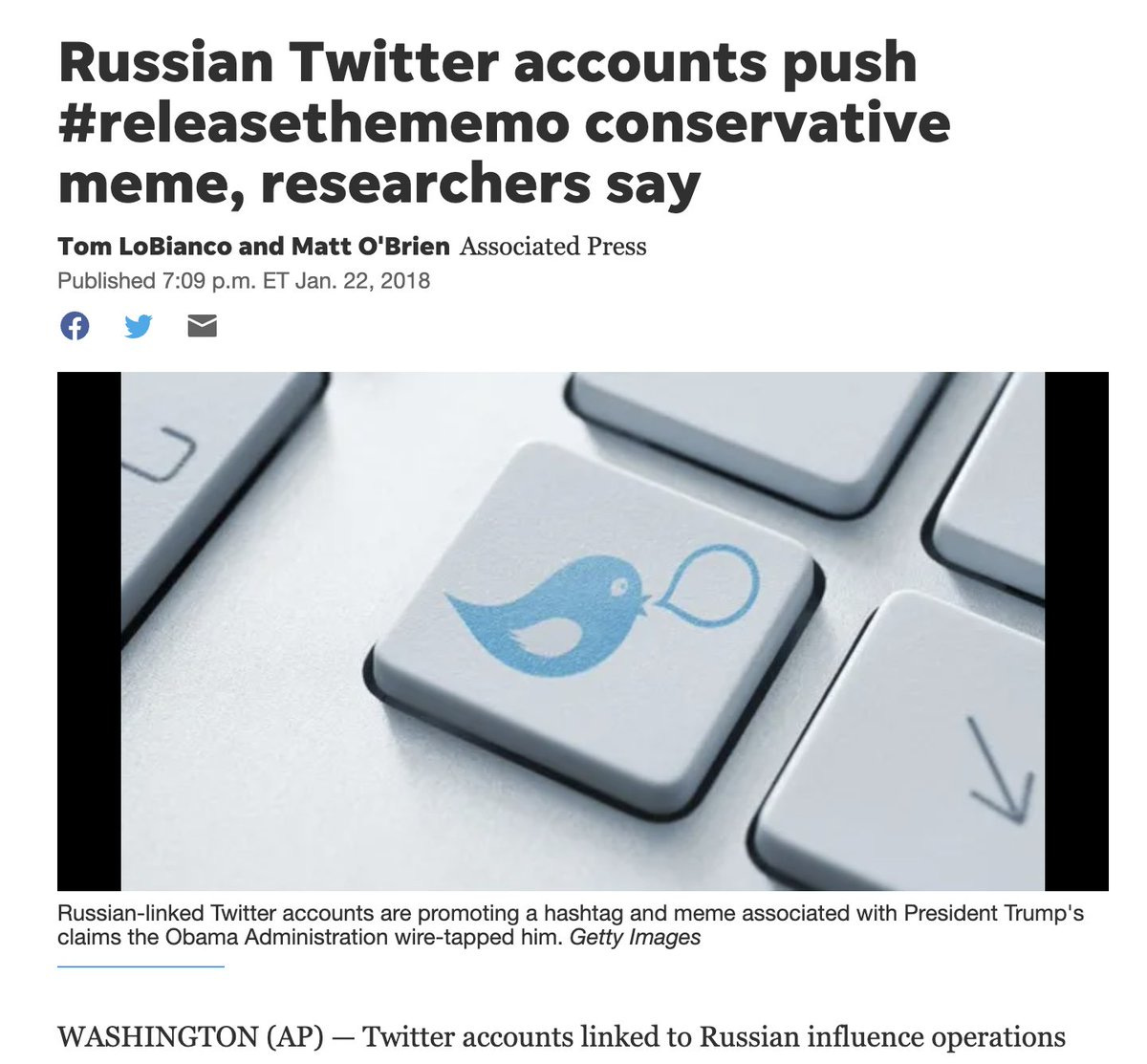1.THREAD: Twitter Files #14
THE RUSSIAGATE LIES
One: The Fake Tale of Russian Bots and the #ReleaseTheMemo Hashtag
2. At a crucial moment in a years-long furor, Democrats denounced a report about flaws in the Trump-Russia investigation, saying it was boosted by Russian “bots” and “trolls.”
3. Twitter officials were aghast, finding no evidence of Russian influence: “We are feeding congressional trolls.”
“Not any…significant activity connected to Russia.”
“Putting the cart before the horse assuming this is propaganda/bots.”
4. Twitter warned politicians and media the not only lacked evidence, but had evidence the accounts weren’t Russian – and were roundly ignored.
5. On January 18th, 2018, Republican Devin Nunes submitted a classified memo to the House Intel Committee detailing abuses by the FBI in obtaining FISA surveillance authority against Trump-connected figures, including the crucial role played by the infamous “Steele Dossier”:
6. The Nunes assertions would virtually all be verified in a report by Justice Department Inspector General Michael Horowitz in December 2019.
7. Nonetheless, national media in January and early February of 2018 denounced the Nunes report in oddly identical language, calling it a “joke”:
9. On January 23rd, 2018, Senator Dianne Feinstein (D-CA) and congressman Adam Schiff (D-CA) published an open letter saying the hashtag “gained the immediate attention and assistance of social media accounts linked to Russian influence operations.”
9b. Feinstein/Schiff said the Nunes memo "distorts" classified information, but note they didn't call it incorrect.
10. Connecticut Senator Richard Blumenthal followed suit, publishing a letter saying, “We find it reprehensible that Russian agents have so eagerly manipulated innocent Americans.”
11. Feinstein, Schiff, Blumenthal, and media members all pointed to the same source: the Hamilton 68 dashboard created by former FBI counterintelligence official Clint Watts, under the auspices of the Alliance for Securing Democracy (ASD).
12. The dashboard, which featured a crude picture of Vladimir Putin deviously blowing evil red Twitter birds into the atmosphere, was vague in how it reached its conclusions.
13. Inside Twitter, executives panned Watts, Hamilton 68, and the Alliance for Securing Democracy. Two key complaints: Hamilton 68 seemed to be everyone’s only source, and no one was checking with Twitter.
14. “I encourage you to be skeptical of Hamilton 68’s take on this, which as far as I can tell is the only source for these stories,” said Global Policy Communications Chief (and future WH and NSC spokesperson) Emily Horne.
She added: “It’s a comms play for ASD.”
15. “All the swirl is based on Hamilton,” said Trust and Safety chief Yoel Roth.
16. “If ASD isn’t going to fact-check with us, we should feel free to correct the record on their work,” said Policy VP Carlos Monje.
17. Roth couldn’t find any Russian connection to #ReleaseTheMemo – at all. “I just reviewed the accounts that posted the first 50 tweets with #releasethememo and… none of them show any signs of affiliation to Russia.”
18. “We investigated, found that engagement as overwhelmingly organic, and driven by VITs” – Very Important Tweeters, including Wikileaks and congressman Steve King.
19. A staffer for “DiFi” – Feinstein – agreed it would be “helpful to know” how Hamilton 68 goes by “the process by which they decide an account is Russian.”
But, only AFTER Feinstein published her letter about Russian influence.
20. When Twitter spoke to a Blumenthal staffer, they tried to “wave him off” because “we don’t believe these are bots.”
21. Added another: “It might be worth nudging Blumenthal’s staffer that it could be in his boss’ best interest not to go out there because it could come back to make him look silly.”
22. One Twitter exec even tried to negotiate, implying an undisclosed future PR concession if Blumenthal would lay off on this:
“It seems like there are other wins we could offer him.”
23. Blumenthal published his letter anyway.
24. Execs eventually grew frustrated over what they saw as a circular process – presented with claims of Russian activity, even when denied, led to more claims.
25. They expressed this explicitly to Blumenthal’s camp, saying “Twitter spent a lot of resources” on this request and the reward from Blumenthal shouldn’t be round after round of requests.”
“We can’t do a user notice each time this happens.”
26. Eventually Twitter staff realize “Blumenthal isn’t looking for real and nuanced solutions” but “just wants to get credit for pushing us further.”
27. Ultimately senior executives talked about “feeding congressional trolls” and compared their situation to the children’s book, “If You Give a Mouse a Cookie.”
28. In the story, if you give a mouse a cookie, he’ll want a glass of milk, which will lead to a wave of other exhausting requests, at the end of which he’ll want a glass of milk. And one more cookie.
29. The metaphor for the endless Russia requests was so perfect, one exec wrote, “I’m legit embarrassed I didn’t think of that first.”
30. Despite universal internal conviction that there were no Russians in the story, Twitter went on to follow a slavish pattern of not challenging Russia claims on the record.
31. Outside counsel from DC-connected firms like Debevoise and Plimpton advised Twitter to use language like, “With respect to particular hashtags, we take seriously any activity that may represent an abuse of our platform.”
32. As a result, reporters from the AP to Politico to NBC to Rolling Stone continued to hammer the “Russian bots” theme, despite a total lack of evidence.
33.Russians weren’t just blamed for #ReleaseTheMemo but #SchumerShutdown, #ParklandShooting, even #GunControlNow – to “widen the divide,” according to the New York Times.
34. Re #SchumerShutdown and #ReleaseTheMemo, the internal guidance was, “Both hashtags appear to be organically trending.”
35. NBC, Politico, AP, Times, Business Insider, and other media outlets who played up the “Russian bots” story – even Rolling Stone – all declined to comment for this story.
36. The staffs of Feinstein, Schiff, and Blumenthal also declined comment.
37. Who did comment? Devin Nunes. "Schiff and the Democrats falsely claimed Russians were behind the Release the Memo hashtag, all my investigative work... By spreading the Russia collusion hoax, they instigated one of the greatest outbreaks of mass delusion in U.S. history.”
38. This #ReleaseTheMemo episode is just one of many in the #TwitterFiles. The Russiagate scandal was built on the craven dishonesty of politicians and reporters, who for years ignored the absence of data to fictional scare headlines.
39. For more, watch @ShellenbergerMD, @bariweiss, @lhfang, @davidzweig, @AlexBerenson, and more.
Read Taibbi.Substack.Com for more on why “America Needs Truth and Reconciliation on Russiagate.”































Post-truth!